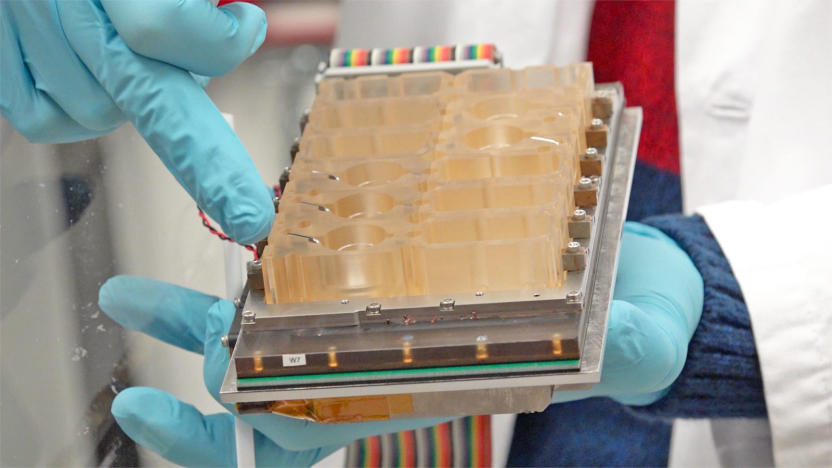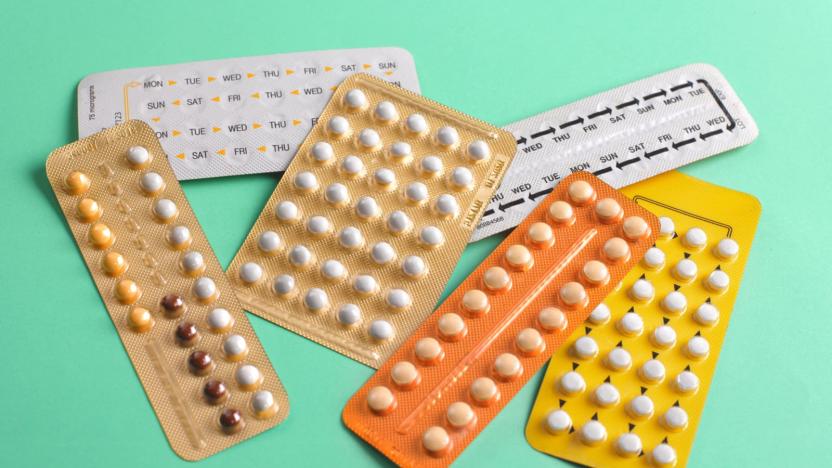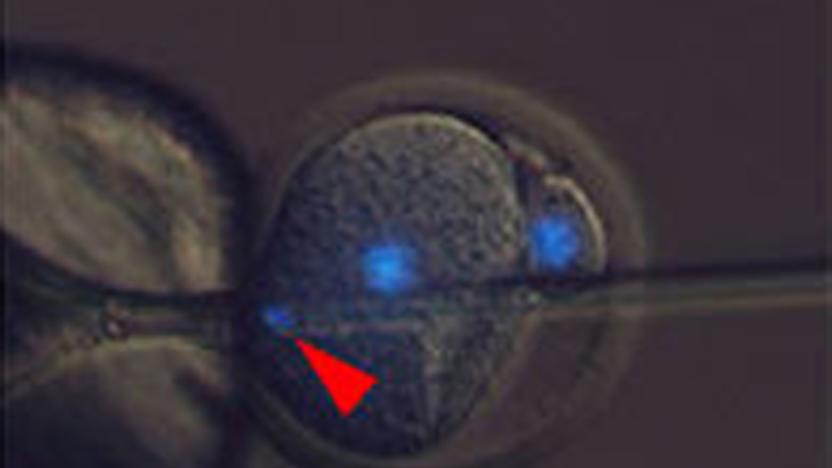reproduction
Latest

Mouse semen experiment suggests humans can reproduce in space
Humans have become relatively experienced at living and working in space aboard the International Space Station. Now, we're looking forward to the next step: reproduction. Mouse sperm, which was freeze-dried and stored aboard the ISS for nine months, was able to produce healthy offspring back on Earth. The research study was published yesterday in the journal Proceedings of the National Academy of Sciences of the United States of America.

Stem cell therapy makes sterile mice fertile again
Researchers at Shanghai's Jiao Tong University have conducted an experiment involving stem cells and sterile mice. Germline stem cells -- the building blocks of an egg -- were taken from a young mouse and implanted into the ovary of a mouse that had been sterilized. Five to eight weeks later, and this implanted mouse was mated with a healthy to see if pregnancy would occur. The experiment, which tested eight such mice, found that six of the group managed to fall pregnant and deliver healthy offspring.

Scientists recreate the female menstrual cycle on a chip
Scientists don't understand as much as they'd like about the female reproductive system, both due to their historical exclusion from studies and the challenge in replicating the complexities of that anatomy. At last, however, there's progress. Researchers have developed an organ on a chip that models a woman's entire reproductive system, including menstruation and hormone-induced responses. It clearly doesn't look like the real thing (see above), but numerous key behaviors are present.

Maven offers free birth control prescriptions via digital doctors
Two days after Donald Trump was elected to be the next president of the United States, searches for the term "IUD" rose more than four times across the country, according to Google Trends. Searches for "Planned Parenthood" and "birth control" similarly spiked as women in the US began preparing for an uncertain future. After all, Donald Trump and his running-mate, Mike Pence, have spoken out against protections for women's reproductive rights and against the Affordable Care Act, which requires insurers to cover intrauterine devices and other forms of contraception. With a Republican Congress, there's a path for Trump to repeal the ACA outright. In response to these concerns, Maven, a New York-based startup that received $2.2 million in funding last year, is offering free digital appointments with a women's health practitioner now through the end of the year. These appointments include a prescription for birth control and information about IUDs.

Researchers produce healthy mice without using fertilized eggs
A mammal needs fertilized egg cells to have children, right? Not so fast. University of Bath scientists report that they're the first to successfully breed healthy mice without any fertilized eggs, instead relying on inactive embryos. The team first doused eggs in strontium chloride, which prevents them from going into a state of arrest while they're turned into embryos -- previous attempts to fool the eggs saw them die within a few days. Researchers then inserted sperm nuclei that reprogrammed the embryos, readying them for the wombs of their surrogate mothers.

Buy us this Earthbound Zero NES reproduction cart
Rose Colored Gaming recently unveiled a beautiful Earthbound Zero reproduction NES cart, complete with a slick plastic case and custom cover art. The cart includes an English-translated ROM of Japanese Nintendo RPG and cult classic Mother. Mother never came to the United States, though Mother 2 was released as Earthbound on SNES in North America, and will see a Wii U Virtual Console port this year. The game that followed in the series, Mother 3 for Game Boy Advance, also never saw official North American localization, though fan translators of the game offered Nintendo to use their work free of charge for further Virtual Console localization purposes. As for Rose Colored Gaming's gorgeous Earthbound Zero reproduction cart, there's no price listed yet on its store as it's working to produce "as many of these as possible for as long as possible." We're just saying, this collectible item would be a great gift for a sorrowful Joystiq editor that has lost hope that any future iterations of the series will come to life in a language they understand. [Thanks, Wes!] %Gallery-192781%

Real-time 3D face reproduction demonstrated on video
Eager to be freaked right on out? If so, head past the break and mash play. There, you'll see a recent demonstration by Tohto C-Tech, where a 3D camera setup was used to capture a person's face and then reproduce it on a monitor (in 3D, no less) in real-time. We're told that an undisclosed GPGPU setup was used to pull it off, as typical CPUs just weren't quick enough to render the final product on their own. The camera setup actually captures the face from two different viewpoints, enabling the sides of the face to be shown in addition to the front. We warned you that copious amounts of freaky were involved.

Shocker! Laptops placed on laps will overheat you where you don't want to be overheated
Scrotal hyperthermia -- even its name sounds like a terrible, horrible thing. Yes, gadget enthusiasts, we're talking about the vastly underrated problem that is the overheating of a techie gentleman's reproductive parts. A study recently published in the Fertility and Sterility journal confirms what we've long known -- that heat escaping laptops sat on laps can and will raise the temperature in your external offspring storage units -- but adds a bit of handy additional info as well. Firstly, it turns out that keeping one's legs together to balance the laptop is mostly to blame, as it doesn't provide enough airflow to let heat escape, while lap pads have been found to be entirely ineffective in protecting testicles from rising in temperature. Another note of import is that the men in this study failed to notice when their scrotal thermometers rose above what's considered safe, so we'd just advise doing your mobile blogging Engadget style: from a bar, a coffee table, the trunk of a car, or even a humble desk.

Sperm gene same as it was 600 million years ago, miraculously still in fashion
We've had a thing for sperm ever since Look Who's Talking broadened our appreciation for the reproductive arts, and now scientists at Northwestern's Feinberg School of Medicine have discovered a wealth of new information about the world's most adored swimmers. Believe it or not, we're now left thinking that they're even more hardcore. Yes, they've been rocking the exact same makeup -- called the Boule gene -- since the dawn of evolution. But as it turns out, that gene is also shared across a huge swath of organisms from humans to fish to fruit flies, and it's only ever used in sperm. This bodes interestingly for the future of reproductive sciences; researchers removed the Boule gene from mice and found that, while otherwise completely normal, they didn't produce sperm. We can almost feel that Gucci case for the male contraceptive pill in our man-purses now. [Photo courtesy of aSIMULAtor]

Xerox innovation can add anti-counterfeit measures to digital printers
Xerox, the same outfit looking to extract information from your web browsing excursions, has now churned out a swank anti-counterfeiting procedure that purportedly allows a vanilla digital printer to "create personalized fluorescent marks on documents." Of course, these fluorescent signatures are commonly used to authenticate currency, and Xerox is hoping that people warm up to the idea of slapping the same level of security onto documents ranging from licenses, certificates, or even personal checks. The method utilizes the "dry ink" found in xerographic printers to create the secure imprint, and curious users can spot the tell-tale sign when exposing the document to ultraviolet light. Of course, you should still be wary of that dubious looking bizhub crammed over in the corner office, but if you're interested in Xerox's latest counterfeit squashing technology, you can snag it as part of the FreeFlow Variable Information Suite 5.0 software.[Via Gizmag]






